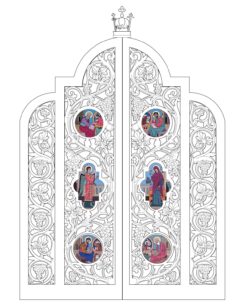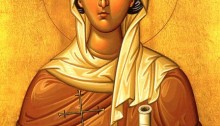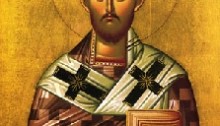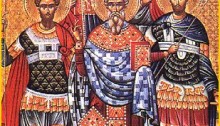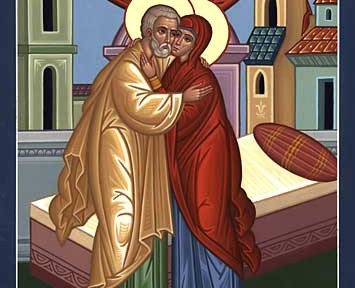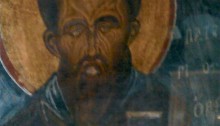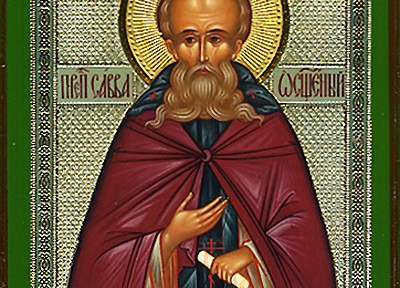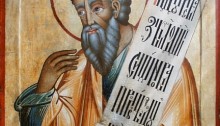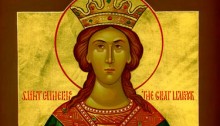This glorious heroine of the Christian Faith was born in Rome into a wealthy senatorial family of a pagan father and a Christian mother. From her early youth, she clung in love to the Lord Jesus, guided in the teaching of Christ by a devout teacher, Chrysogonus. Anastasia was forced by her father to enter into marriage with a pagan landowner, Publius. Excusing herself on the basis of a female illness, she in no way wished to enter into physical relations with him. For this, her husband tortured her harshly by confinement and starvation. He inflicted even more tortures upon her when he learned of her secret visits to the prisons of the Christian martyrs: bringing them provisions, ministering to them, bathing their wounds and loosening their bonds. But by God’s providence she was freed from her wicked husband. Publius was sent to Persia by the emperor, and while sailing on the sea he was drowned. St. Anastasia then began to minister freely to the tortured Christian martyrs and to comfort the poor, giving them alms from her great inheritance. At one time the Emperor Diocletian was in the town of Aquileia and ordered that Chrysogonus, the confessor of Christ, be brought to him. St. Anastasia accompanied him on the way. Holy Chrysogonus was beheaded by order of the emperor, and then three sisters-Agape, Chionia and Irene-also suffered (April 16): the first two were cast into fire and the third was shot through with arrows. St. Anastasia took their bodies, wrapped them in white linen, anointed them with many aromatic spices, and honorably buried them. Following this, Anastasia went to Macedonia, where she helped the sufferers for Christ. There she became well known as a Christian, for which she was seized and brought before various judges for interrogation and torture. Desiring to die for her beloved Christ, Anastasia constantly longed for Him in her heart. A certain chief of the pagan priests, Ulpianus, lustfully tried to touch St. Anastasia’s body, but he was suddenly blinded and breathed his last. Condemned to death by starvation, St. Anastasia lingered in prison for thirty days without food, nourishing herself only on tears and prayer. Then she was placed in a boat with several other Christians to be drowned, but God delivered her even from this death. She was finally tied by the feet and hands to four wheels over a fire, and she gave up her holy soul to God. She suffered and took up her habitation in the Kingdom of Christ in the year 304. (Prologue of Ohrid) Continue reading December 22, 2013 Sunday of the Holy Fathers, Octoechos Tone 6 Holy Great-Martyr Anastasia
Continue reading December 22, 2013 Sunday of the Holy Fathers, Octoechos Tone 6 Holy Great-Martyr Anastasia
Category: Texts
December 15, 2013 Sunday of the Holy Forefathers, Octoechos Tone 5 Holy Martyr Eleutherius
From a good tree comes good fruit. This wonderful saint had noble and greatly eminent parents. Eleutherius was born in Rome, where his father was an imperial proconsul. His mother Anthia heard the Gospel from the great Apostle Paul and was baptized by him. Having been left a widow early, she entrusted her only son for study and service to Anicetus the Bishop of Rome. Seeing how Eleutherius was gifted by God and illumined by the grace of God, the bishop ordained him a deacon at the age of fifteen, a priest at the age of eighteen, and a bishop at the age of twenty. Eleutherius’s God-given wisdom made up for what he lacked in years, and this chosen one of God was appointed Bishop of Illyria with his seat in Valona (Avlona), Albania. The good shepherd guarded his flock well and increased their number day by day. Emperor Hadrian, a persecutor of Christians, sent the commander Felix with soldiers to seize Eleutherius and bring him to Rome. When the raging Felix arrived in Valona and entered the church, he saw and heard the holy hierarch of God; suddenly his heart changed, and he became a Christian. Eleutherius baptized Felix and departed for Rome with him, returning joyfully as if he were going to a feast and not to trial and torture. The emperor subjected the noble Eleutherius to harsh torture: flogging, roasting on an iron bed, boiling in pitch, and burning in a fiery furnace. But Eleutherius was delivered from all these deadly tortures by God’s power. Seeing all this, Caribus the Roman eparch declared that he also was a Christian. Caribus was tortured and then beheaded, and so was Blessed Felix. Finally, the imperial executioners cut off the honorable head of St. Eleutherius. When his mother, the holy Anthia, came and stood over the dead body of her son, she also was beheaded. Their bodies were translated to Valona, where even today St. Eleutherius glorifies the name of Christ by his many miracles. He suffered during the reign of Hadrian in the year 120. (Prologue of Ohrid)
 Continue reading December 15, 2013 Sunday of the Holy Forefathers, Octoechos Tone 5 Holy Martyr Eleutherius
Continue reading December 15, 2013 Sunday of the Holy Forefathers, Octoechos Tone 5 Holy Martyr Eleutherius
December 13, 2013 The Holy Martyrs Eustratios, Auxentius, Eugenius, Mardarius and Orestes and the Holy Virgin Martyr Lucy
These five courageous men shone like five shining stars in the dark days of the Christ-persecuting Emperors Diocletian and Maximian. St. Eustratius was a Roman commander in the city of Satalionus; Eugene was his companion in the army; Orestes was likewise a distinguished soldier; Auxentius was a priest; and Mardarius was an ordinary citizen who came, like Eustratius, from the town of Arabrak. The imperial deputies Lysias and Agricolus tortured Auxentius first since he was a priest. Seeing the innocent suffering of Christians, Eustratius appeared in front of Lysias and declared that he was also a Christian. While Eustratius was being tortured, Eugene appeared before the judge and cried out: “Lysias, I too am a Christian.” When Eustratius was led through the town of Arabrak with the other martyrs, Mardarius saw them from the roof of his house. He took leave of his wife and two young children and rushed after the martyrs, shouting into the faces of the tormentors: “I too am a Christian, like my lord Eustratius.” When St. Orestes was target-practicing in the presence of Lysias, the cross he was wearing fell from his chest and Lysias realized that he was a Christian, after which Orestes openly confessed his faith. Orestes was a young and handsome soldier and towered above all the other soldiers in stature. Auxentius was beheaded, Eugene and Mardarius died while being tortured, Orestes expired on a red-hot iron grid, and Eustratius died in a fiery furnace. St. Blaise (February 11) administered Holy Communion to St. Eustratius in prison before his death. Their relics were later taken to Constantinople and buried in the church dedicated to them: The Holy Five Companions. They were seen alive in that church, and St. Orestes appeared to St. Dimitri of Rostov (October 28). A beautiful prayer by St. Eustratius is extant, which is read at the Midnight Service on Saturday: “Most highly do I magnify Thee, O Lord.” (Prologue of Ohrid) Continue reading December 13, 2013 The Holy Martyrs Eustratios, Auxentius, Eugenius, Mardarius and Orestes and the Holy Virgin Martyr Lucy
Continue reading December 13, 2013 The Holy Martyrs Eustratios, Auxentius, Eugenius, Mardarius and Orestes and the Holy Virgin Martyr Lucy
December 9, 2013 Conception of St. Anna
The righteous Joachim and Anna were childless for fifty years of their married life. In their old age the Archangel Gabriel appeared to each one of them separately, telling them that God had heard their prayers and that they would give birth to a daughter, Mary. Then St. Anna conceived by her husband and after nine months bore a daughter blessed by God and by all generations of men: the Most-holy Virgin Mary, the Theotokos. (Prologue of Ohrid) Continue reading December 9, 2013 Conception of St. Anna
Continue reading December 9, 2013 Conception of St. Anna
December 8, 2013 29th Sunday after Pentecost, Octoechos Tone 4 Our Venerable Father Patapius
Patapius was born and brought up in the Faith and in the fear of God by pious parents in the Egyptian city of Thebes. At an early age he perceived and abhorred the vanity of this world and withdrew into the wilderness of Egypt. There he devoted himself to a life of asceticism, cleansing his heart of all earthly desires and thoughts, for the sake of God’s love. However, when his virtues became known among the people, they began to come to him and to seek solace from him in their sufferings. Fearing the praise of men, which darkens the minds of men and separates them from God, Patapius fled this wilderness to Constantinople, for this wonderful saint thought that he could hide himself more easily from people in the city than in the wilderness. Patapius built a hut for himself in the proximity of the Church of Blachernae in Constantinople. There, immured and unknown, he continued his interrupted life of eremetic asceticism. However, a light cannot be hidden. A child, blind from birth, was led by God’s providence to St. Patapius. He besought the saint to pray to God that he be given his sight and be able to look upon God’s creation-thus allowing him to praise God all the more. Patapius having compassion on the suffering child, prayed to God, and the child’s sight was restored. This miracle revealed God’s chosen one throughout the entire city, and people rushed to him for healing, comfort and instruction. Patapius healed an eminent man of dropsy by tracing the sign of the Cross over him and anointing him with oil. By making the sign of the Cross in the air with his hand, he freed a youth from an unclean spirit that had cruelly tormented him. The evil spirit, with a loud shriek, came out from God’s creature like smoke. He made the sign of the Cross over a woman who had a sore on her breast all filled with worms, and made her healthy. Many other miracles did St. Patapius perform, all through prayer in the name of Christ and by the sign of the Cross. He entered into rest peacefully in great old age and took up his habitation in the Heavenly Kingdom in the seventh century. (Prologue of Ohrid) Continue reading December 8, 2013 29th Sunday after Pentecost, Octoechos Tone 4 Our Venerable Father Patapius
Continue reading December 8, 2013 29th Sunday after Pentecost, Octoechos Tone 4 Our Venerable Father Patapius
December 6, 2013 Our Holy Father Nicholas the Wonderworker, Archbishop of Myra in Lycia
This glorious saint, celebrated even today throughout the entire world, was the only son of his eminent and wealthy parents, Theophanes and Nona, citizens of the city of Patara in Lycia. Since he was the only son bestowed on them by God, the parents returned the gift to God by dedicating their son to Him. St. Nicholas learned of the spiritual life from his uncle Nicholas, Bishop of Patara, and was tonsured a monk in the Monastery of New Zion founded by his uncle. Following the death of his parents, Nicholas distributed all his inherited goods to the poor, not keeping anything for himself. As a priest in Patara, he was known for his charity, even though he carefully concealed his charitable works, fulfilling the words of the Lord: Let not thy left hand know what thy right hand doeth (Matthew 6:3). When he gave himself over to solitude and silence, thinking to live that way until his death, a voice from on high came to him: “Nicholas, for your ascetic labor, work among the people, if thou desirest to be crowned by Me.” Immediately after that, by God’s wondrous providence, he was chosen archbishop of the city of Myra in Lycia. Merciful, wise and fearless, Nicholas was a true shepherd to his flock. During the persecution of Christians under Diocletian and Maximian, he was cast into prison, but even there he instructed the people in the Law of God. He was present at the First Ecumenical Council of Nicaea [325] and, out of great zeal for the truth, struck the heretic Arius with his hand. For this act he was removed from the Council and from his archiepiscopal duties, until the Lord Christ Himself and the Most-holy Theotokos appeared to several of the chief hierarchs and revealed their approval of Nicholas. A defender of God’s truth, this wonderful saint was ever bold as a defender of justice among the people. On two occasions, he saved three men from an undeserved sentence of death. Merciful, truthful, and a lover of justice, he walked among the people as an angel of God. Even during his lifetime, the people considered him a saint and invoked his aid in difficulties and in distress. He appeared both in dreams and in person to those who called upon him, and he helped them easily and speedily, whether close at hand or far away. A light shone from his face as it did from the face of Moses, and he, by his presence alone, brought comfort, peace and good will among men. In old age he became ill for a short time and entered into the rest of the Lord, after a life full of labor and very fruitful toil, to rejoice eternally in the Kingdom of Heaven, continuing to help the faithful on earth by his miracles and to glorify his God. He entered into rest on December 6, 343. (Prologue of Ohrid) Continue reading December 6, 2013 Our Holy Father Nicholas the Wonderworker, Archbishop of Myra in Lycia
Continue reading December 6, 2013 Our Holy Father Nicholas the Wonderworker, Archbishop of Myra in Lycia
December 5, 2013 Our Venerable and God-Bearing Father Sabbas the Sanctified
The unknown village of Mutalaska, in the province of Cappadocia, became famous through this great luminary of the Orthodox Church. Sava was born there of his parents John and Sophia. At the age of eight, he left the home of his parents and was tonsured a monk in a nearby monastic community called Flavian’s. After ten years, he moved to the monasteries of Palestine and remained longest in the Monastery of St. Euthymius the Great (January 20) and Theoctistus. The clairvoyant Euthymius prophesied of Sava that he would become a famous monk and a teacher of monks and that he would establish a lavra greater than all the lavras of that time. After the death of Euthymius, Sava withdrew to the desert, where he lived for five years as a hermit in a cave shown to him by an angel of God. Afterward, when he had been perfected in the monastic life, he began by divine providence to gather around him many who were desirous of the spiritual life. Soon, such a large number gathered that Sava had to build a church and many cells. Some Armenians also came to him, and for them he provided a cave where they would be able to celebrate services in the Armenian language. When his father died, his aged mother Sophia came to him, and he tonsured her a nun. He gave her a cell located at a distance from his monastery, where she lived a life of asceticism until her death. This holy father endured many assaults from all sides: from those who were close to him, from heretics, and from demons. But he triumphed over them all: those close to him, by kindness and indulgence; the heretics, by his unwavering confession of the Orthodox Faith; the demons, by the sign of the Cross and calling upon God for help. He had a particularly great struggle with demons on Mount Castellium, where he established his second monastery. In all, Sava established seven monasteries. He and Theodosius the Great, his neighbor, are considered to be the greatest lights and pillars of Orthodoxy in the East. They corrected emperors and patriarchs in matters of the Faith, and to everyone they served as an example of saintly humility and the miraculous power of God. After a toilsome and very fruitful life, St. Sava entered into rest in the year 532, at the age of ninety-four. Among his many wondrous and good works, let it at least be mentioned that he was the first to compile the Order of Services for use in monasteries, now known as the Jerusalem Typicon. (Prologue of Ohrid) Continue reading December 5, 2013 Our Venerable and God-Bearing Father Sabbas the Sanctified
Continue reading December 5, 2013 Our Venerable and God-Bearing Father Sabbas the Sanctified
December 1, 2013 28th Sunday after Pentecost, Octoechos Tone 3 Holy Prophet Nahum
Nahum was born of the tribe of Simeon in a place called Elkosh on the far side of the Jordan. He lived about seven hundred years before Christ and prophesied the destruction of Nineveh about two hundred years after the Prophet Jonah. Because of Jonah’s preaching, the Ninevites had repented, and God had spared them and not destroyed them. In time, however, they forgot God’s mercy and again became corrupt. The Prophet Nahum prophesied their destruction, and since there was no repentance, God did not spare them. The entire city was destroyed by earthquake, flood and fire, so that its location is no longer known. St. Nahum lived for forty-five years and entered into rest in the Lord, leaving us a small book of his true prophecies. (Prologue of Ohrid) Continue reading December 1, 2013 28th Sunday after Pentecost, Octoechos Tone 3 Holy Prophet Nahum
Continue reading December 1, 2013 28th Sunday after Pentecost, Octoechos Tone 3 Holy Prophet Nahum
November 30, 2013 Holy and All-Praiseworthy Apostle Andrew the First-Called
Andrew, the son of Jonah and brother of Peter, was born in Bethsaida and was a fisherman by trade. At first he was a disciple of St. John the Baptist, but when St. John pointed to the Lord Jesus, saying, Behold the Lamb of God! (John 1:36), Andrew left his first teacher and followed Christ. Then, Andrew brought his brother Peter to the Lord. Following the descent of the Holy Spirit, it fell by lot to the first apostle of Christ, St. Andrew, to preach the Gospel in Byzantium and Thrace, then in the lands along the Danube and in Russia around the Black Sea, and finally in Epirus, Greece and the Peloponnese, where he suffered. In Byzantium, he appointed St. Stachys as its first bishop; in Kiev, he planted a Cross on a high place and prophesied a bright Christian future for the Russian people; throughout Thrace, Epirus, Greece and the Peloponnese, he converted multitudes of people to the Faith and ordained bishops and priests for them. In the city of Patras, he performed many miracles in the name of Christ, and won many over to the Lord. Among the new faithful were the brother and wife of the Proconsul Aegeates. Angered at this, Aegeates subjected St. Andrew to torture and then crucified him. While the apostle of Christ was still alive on the cross, he gave beneficial instructions to the Christians who had gathered around. The people wanted to take him down from the cross but he refused to let them. Then the apostle prayed to God and an extraordinary light encompassed him. This brilliant illumination lasted for half an hour, and when it disappeared, the apostle gave up his holy soul to God. Thus, the First-called Apostle, the first of the Twelve Great Apostles to know the Lord and follow Him, finished his earthly course. St. Andrew suffered for his Lord in the year 62. His relics were taken to Constantinople; his head was later taken to Rome, and one hand was taken to Moscow. (Prologue of Ohrid) Continue reading November 30, 2013 Holy and All-Praiseworthy Apostle Andrew the First-Called
Continue reading November 30, 2013 Holy and All-Praiseworthy Apostle Andrew the First-Called
November 24, 2013 27th Sunday after Pentecost, Octoechos Tone 2 Holy Great-Martyr Catherine; Holy Great-Martyr Mercurius
Catherine was the daughter of King Constus. After the death of her father, she lived with her mother in Alexandria. Her mother was secretly a Christian who, through her spiritual father, brought Catherine to the Christian Faith. In a vision, St. Catherine received a ring from the Lord Jesus Himself as a sign of her betrothal to Him. This ring remains on her finger even today. Catherine was greatly gifted by God and was well educated in Greek philosophy, medicine, rhetoric and logic. In addition to that, she was of unusual physical beauty. When the iniquitous Emperor Maxentius offered sacrifices to the idols and ordered others to do the same, Catherine boldly confronted the emperor and denounced his idolatrous errors. The emperor, seeing that she was greater than he in wisdom and knowledge, summoned fifty of his wisest men to debate with her on matters of faith and to put her to shame. Catherine outwitted and shamed them. In a rage, the emperor ordered all fifty of those men burned. By St. Catherine’s prayers, all fifty confessed the name of Christ and declared themselves Christians before their execution. After Catherine had been put in prison, she converted the emperor’s commander, Porphyrius, and two hundred soldiers to the true Faith, as well as Empress Augusta-Vasilissa herself. They all suffered for Christ. During the torture of St. Catherine, an angel of God came to her and destroyed the wheel on which the holy virgin was being tortured. Afterward, the Lord Jesus Christ Himself appeared to her and comforted her. After many tortures, Catherine was beheaded at the age of eighteen, on November 24, 310. Milk, instead of blood, flowed from her body. Her miracle-working relics repose on Mount Sinai.
When Emperor Decius once waged war against the barbarians, there was in his army the commander of an Armenian regiment called the Martenesians. This commander was named Mercurius. In battle, an angel of the Lord appeared to Mercurius, placed a sword in his hand, and assured him of victory over his enemies. Indeed, Mercurius displayed wonderful courage, mowing down the enemy like grass. Following this glorious victory Emperor Decius made him chief commander of his army, but envious men reported Mercurius to the emperor for being a Christian, a fact which he did not hide but openly acknowledged before the emperor. Mercurius was tortured harshly and at length; he was cut into strips with knives and burned with fire. An angel of God appeared to him in prison and healed him. Finally, the emperor proclaimed that General Mercurius be beheaded in Cappadocia. When they beheaded him, his body became as white as snow and emitted a most wonderful incense-like fragrance. His miracle-working relics healed many of the sick. This most wonderful soldier of Christ suffered for the Faith sometime between the years 251 and 259 and took up his habitation in the Kingdom of his King and God. . (Prologue of Ohrid)


 Continue reading November 24, 2013 27th Sunday after Pentecost, Octoechos Tone 2 Holy Great-Martyr Catherine; Holy Great-Martyr Mercurius
Continue reading November 24, 2013 27th Sunday after Pentecost, Octoechos Tone 2 Holy Great-Martyr Catherine; Holy Great-Martyr Mercurius
